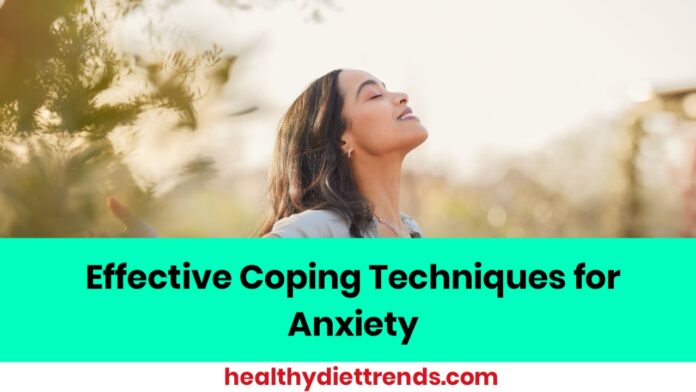Journaling, grounding techniques, physical movement, and meditation are among the many strategies that can help you reduce and manage anxiety symptoms. Anxiety is often triggered by stress — the body’s natural response to perceived threats. But when stress becomes chronic, anxiety can turn from an occasional symptom into a lasting mental health condition.
Anxiety disorders refer to a group of conditions that share anxiety as a core symptom. While professional help is often necessary, building coping skills is key to long-term relief.
5 Techniques for Coping with Anxiety in the Moment
These in-the-moment strategies can help manage anxiety symptoms before they become overwhelming. With practice, they can become powerful tools.
1. Question Your Thought Patterns
Unhelpful thoughts often distort your perception of a situation. Negative self-talk and cognitive distortions can fuel anxiety. One effective method is to challenge these thoughts — ask yourself whether they are based on facts or assumptions. This mental exercise is part of a technique known as cognitive restructuring.
2. Practice Focused, Deep Breathing

Deep breathing slows your heart rate and can create a sense of calm. Try inhaling for 4 counts and exhaling for 4 counts over 5 minutes. The 4-7-8 breathing technique is also popular for managing anxiety on the spot.
3. Use Aromatherapy
Some studies suggest aromatherapy may reduce anxiety in certain settings. Scents like lavender, chamomile, and sandalwood may help calm your senses. You can use essential oils, candles, or incense at your workspace or home for relaxation.
4. Move More and Exercise
Physical activity helps lower stress hormone levels, especially cortisol. Even a short burst of movement — like brisk walking, yoga, or jumping jacks — can shift your focus and improve your mood. Regular activity also improves long-term emotional resilience.
5. Try Grounding Techniques
Grounding brings your awareness to the present moment through sensory focus. A simple method is the 333 rule: notice 3 things you can see, hear, and touch. This helps reduce panic by reconnecting with your surroundings.
6 Strategies for Managing Anxiety Long Term
When anxiety becomes persistent or interferes with daily life, it’s important to work with a mental health professional. Alongside therapy, these strategies can support long-term well-being.
1. Identify and Manage Triggers
Anxiety triggers vary from person to person. Common ones include deadlines, social conflict, past trauma, health conditions, or even caffeine. Understanding your unique triggers helps you avoid or manage them proactively.
2. Learn About Medications
Certain medications can cause anxiety as a side effect or during withdrawal. Ask your healthcare provider if anxiety might be related to your prescription. On the other hand, medication like SSRIs, SNRIs, benzodiazepines, or tricyclic antidepressants may help if symptoms are severe.
3. Practice Daily Meditation
Meditation helps train your brain to respond calmly to anxious thoughts. It can also reduce your overall stress response. Options include mindfulness meditation, walking meditation, guided imagery, or yoga.
4. Keep a Journal
Journaling daily can help you track anxiety triggers and identify what coping tools work best. The act of writing also promotes emotional clarity and calm. One 2018 study found that regular emotional journaling reduced distress, anxiety, and depression.
5. Try to Socialize More
Spending time with friends or loved ones can significantly improve your mental health. Social interactions boost feelings of connection, reduce stress, and build resilience. Even brief daily conversations can make a difference.
6. Stay Physically Active
Exercise isn’t just good for your body — it’s a proven anxiety reliever. Long-term benefits include improved sleep, balanced mood, better energy levels, and reduced overall anxiety symptoms.
Summary
Managing anxiety takes time, self-awareness, and consistency. In-the-moment coping techniques like deep breathing, grounding, and movement can offer quick relief. Long-term strategies — from therapy and meditation to socialization and exercise — can help you build a healthier relationship with anxiety over time.
Also Read : Companies Are Putting Profits Ahead of Public Health



